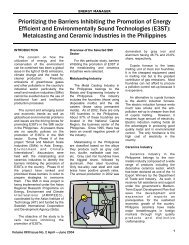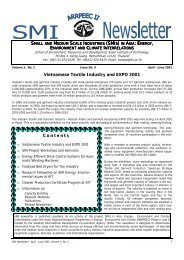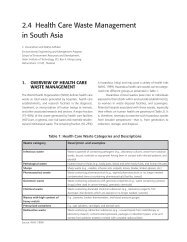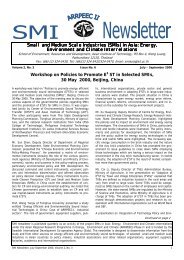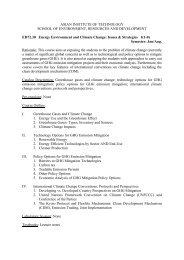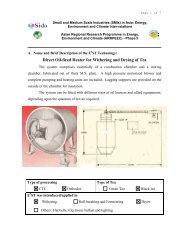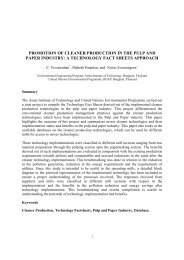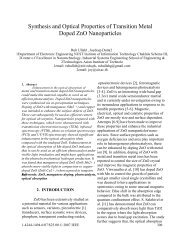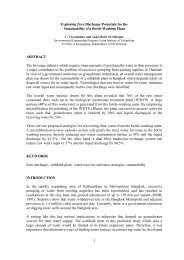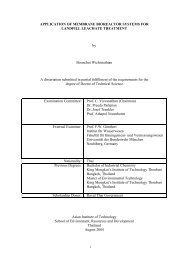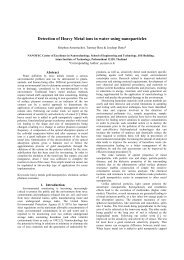Healthcare Waste Report - Environment Health
Healthcare Waste Report - Environment Health
Healthcare Waste Report - Environment Health
Create successful ePaper yourself
Turn your PDF publications into a flip-book with our unique Google optimized e-Paper software.
Department heads<br />
Department heads are responsible for the<br />
segregation, storage, and disposal of waste<br />
generated in their departments. They should<br />
ensure that all doctors, nurses, and clinical and<br />
non-clinical professional staff in respective<br />
departments are aware of the segregation and<br />
storage procedures. Further, to assist the staff<br />
of the department to liaise to monitor the<br />
standard working procedures and to train key<br />
staff members in waste segregation and<br />
disposal procedures. Besides, department<br />
heads have the responsibility to encourage<br />
medical and nursing staff to be cautious so as<br />
to ensure that secondary staff follow correct<br />
procedures at all times.<br />
Doctors, nurses, laborers, care takers of<br />
patients<br />
The roles of doctors, nurses, laborers, care<br />
takers of patients include following the correct<br />
procedures for segregation, storage, transport,<br />
and disposal of waste and maintaining highest<br />
standards in healthcare waste management.<br />
Further, nurses and laborers should participate<br />
in continuous training on handling and<br />
disposal of waste and other waste<br />
management issues specific to the<br />
departments. Care takers of patients should<br />
comply with the waste management practices<br />
of the facility and cooperate with them.<br />
CHAPTER 5_RECOMMENDATIONS<br />
External stakeholders<br />
The success of the healthcare waste<br />
management depends on not only the internal<br />
stakeholder participation but also external<br />
stakeholder commitment and participation.<br />
The roles of the external stakeholders are<br />
briefly described below.<br />
Government and policymakers<br />
The role of policymakers is to formulate<br />
integrated, responsive, realistic and sound<br />
healthcare waste management policies and<br />
legislations to address the healthcare waste in<br />
an appropriate manner. Further, the<br />
government is responsible for developing a<br />
framework for the controlled disposal of<br />
HCW and to ensure that healthcare centers to<br />
share the responsibility to manage wastes<br />
appropriately.<br />
Law enforcement authorities<br />
These authorities have the responsibility to<br />
ensure compliance with prevailing regulations,<br />
to monitor and initiate action against<br />
violators. The gradual implementation of the<br />
law enforcement by the authorities is<br />
recommended in preference to introduce all<br />
measures simultaneously, particularly where<br />
existing practices are inadequate.<br />
<strong>Waste</strong> management service providers<br />
The service providers for waste disposal<br />
should insist on segregation of waste adhering<br />
to prevailing regulations. Further, they should<br />
ensure the correct segregation of waste at the<br />
point of generation by clear identification of<br />
the different categories of waste. The service<br />
providers for waste disposal should insist on<br />
segregation of waste adhering to prevailing<br />
regulations<br />
Academia<br />
The academia has the duty to build capacity<br />
at academic level for better healthcare waste<br />
management. This will enhance the awareness<br />
concerning the proper healthcare waste<br />
management and its importance among the<br />
communities.<br />
130




